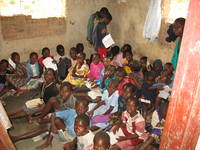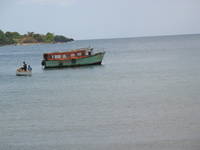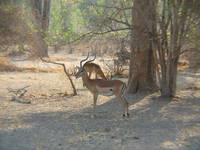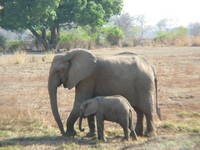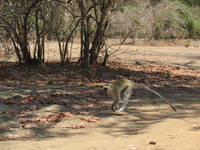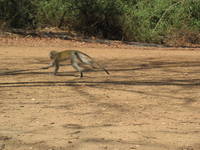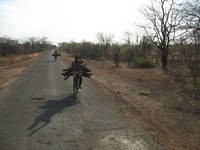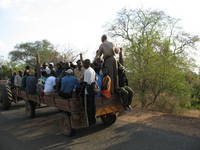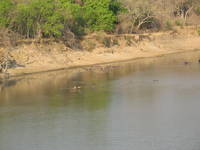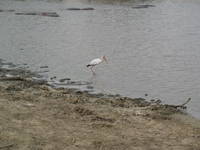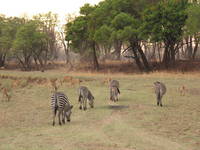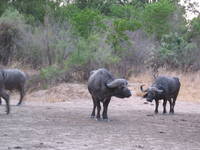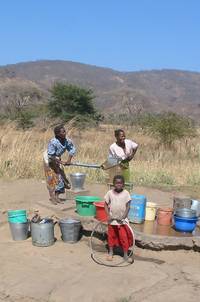
General Information
Language
Tropical Malawi is home to no less than eleven different ethnic communities. Official languages include Chichewa, the native tongue of the Chewa people (the country´s largest tribe) and English, which is spoken mainly in towns, cities and tourist locations. However, even in remote villages it's still possible to find at least one individual who is sufficiently fluent in the language.
Telecomunication; Media; Internet
It can be difficult at times to make international phone calls from Malawi as landline quality is generally poor. The most convenient option is to use a cell phone, for both making calls and exchanging SMS's.Meanwhile the number of internet cafes in the country is rapidly increasing. However, as of yet international publications are only occasionally available here.
Crime
Unlike other countries in Africa crime is relatively low in Malawi, even by European standards, and is generally restricted to a few specific areas of the bigger cities. But like anywhere in the world it is best not to have any money in your back-pockets and have only enough in the others for purchasing small, everyday items. We also strongly recommend that you don't walk alone (if at all) in badly-lit areas unless specifically reassured by us that it is safe to do so.
Roads
Main roads througout the country are surfaced and generally in good condition but, Africa being Africa, you have to ease your way through the odd pothole from time to time. Tracks inside the parks however, as with those leading to and from them, are generally unsurfaced. Such roads therefore only become a potential problem during the rainy season, which lasts from December through to March, whereas during the dry season there is little need to use four wheel drive .With all this in mind when planning our routes we always take the utmost care in finding the least bumpy way, while ensuring that you enjoy an authentic African safari experience.
Food
The quality of food in the restaurants on our tours is excellent as is the level of hygene. Consequently no customer of ours has ever experienced a health problem. Even in the finest restaurants in Africa however, the choice of available dishes on any given menu is, by European standards, somewhat limited.In the morning there is usually a choice of either a continental or English breakfast and dinners usually consist of three hearty courses.Organic fruits, vegetables and meat here in Malawi are often fresher and tastier than those found in Europe. Malawian coffee and tea are of the finest quality.On a more thirst quenching note: Carlsberg is brewed locally here in Malawi and is popular with most our guests.Excellent South African wines are also available as is bottled water. We do not recommend that you drink any tap water without confirming that it is safe to drink beforehand.
Preparations
Suitcases are not really suitable for a journey in Africa, therefore we highly recommend the good old backpack, or any kind of bag made of flexible materials. We would also like to inform you that laundry fascilites are available along the way so the there is little need to bring along a large wardrobe. However, please pack with significant variation of temperature levels in mind. Warm clothing in the evenings is a necessity in many elevated areas and a wind proof jacket and a sweater would not go astray. Any articles of clothing that you do not wish to take back with you can easily be swapped for souveniers, or given away as presents.Two essential items to bring along with you are a flashlight and a pair of binoculars, the quality of which will significantly affect your birding and game-viewing experience!
Visa
A passport is needed when entering Malawi, which must be valid for at least six months. Citizens of some countries (ie., Britain, The Netherlands, Germany, etc.) do not require a visa. Please contact your nearest Malawian Embassy for confirmation.*Please note: at the time of writing tourist visas for Zambia are obtainable at the border.
Money
Since July 2008, the $30 airport tax (that formerly had to be paid in cash when leaving the country) is now included in the cost of your ticket. However, as drinks are not included in the tour price you may need to bring some petty cash (US$ preferably) along with you.Credit cards are good as a back-up, but you'd be hard pushed to find a place that accepts them for payment.In shops and on the market only the local currency, the Malawian (or Zambian) Kwacha, is accepted. ATM machines accepting international cards are available only in the major centers.
HealthTake your vaccination card to your doctor, tell him about the destination of your journey, and get a prescription for Malaria prophylaxis and start taking the course as advised.
Yellow-fever vaccination is not required to visit Malawi and Zambia at the time of writing (December 2008).
More Health Information:
Malawi and Zambia are two of the healthiest regions in Africa to travel to, therefore the chance of catching a disease on one of our tours is very small. To the best of our knowledge none of our guests has ever caught any.Most Diseases in Africa are related to easily-avoidable urban areas where high levels of poverty exists. But when you consider
the clean air you'll be breathing, no BSE, the wonderful food you'll be eating, the relaxing pace of African life, the empty roads, wide horizons, pristine nature, and lots of glorious sunshine--even in the rainy season--it's possible that you just might head home feeling a good-deal healthier than when you came.
Malaria
There is something called malaria here however, which is only transmitted by night flying mosquitos.
There is at the present moment in time no possibility to vaccinate against the desease and no drug exists that guarantees 100% protection. On a journey to Malawi between May and November however, the chance of getting malaria is very, very low simply because it is the driest period of the year. Therefore you will not meet many mosquitos on your way during this time ... if at all. Even in the height of wet season if you cover up appropriately at dusk and dawn and methodically check your mosquito net for possible intruders before you went to sleep, the chance of getting malaria is still low. If you take malaria prophylaxis as advised, wear clothing that covers yourself between dusk and dawn, and always sleep under a mosquito net, the chances of catching malaria are very very small.
Bilharzia
You may or may not have heard about this disease before, which is transmitted to humans in still, reedy lakes and rivers in Africa by water snails. In Lake Malawi such snails do occur, but only at a few select well-known locations, which of course we avoid. To the best of our knowledge the beautiful lakeshore beaches we take you to are completely free of bilharzia!
